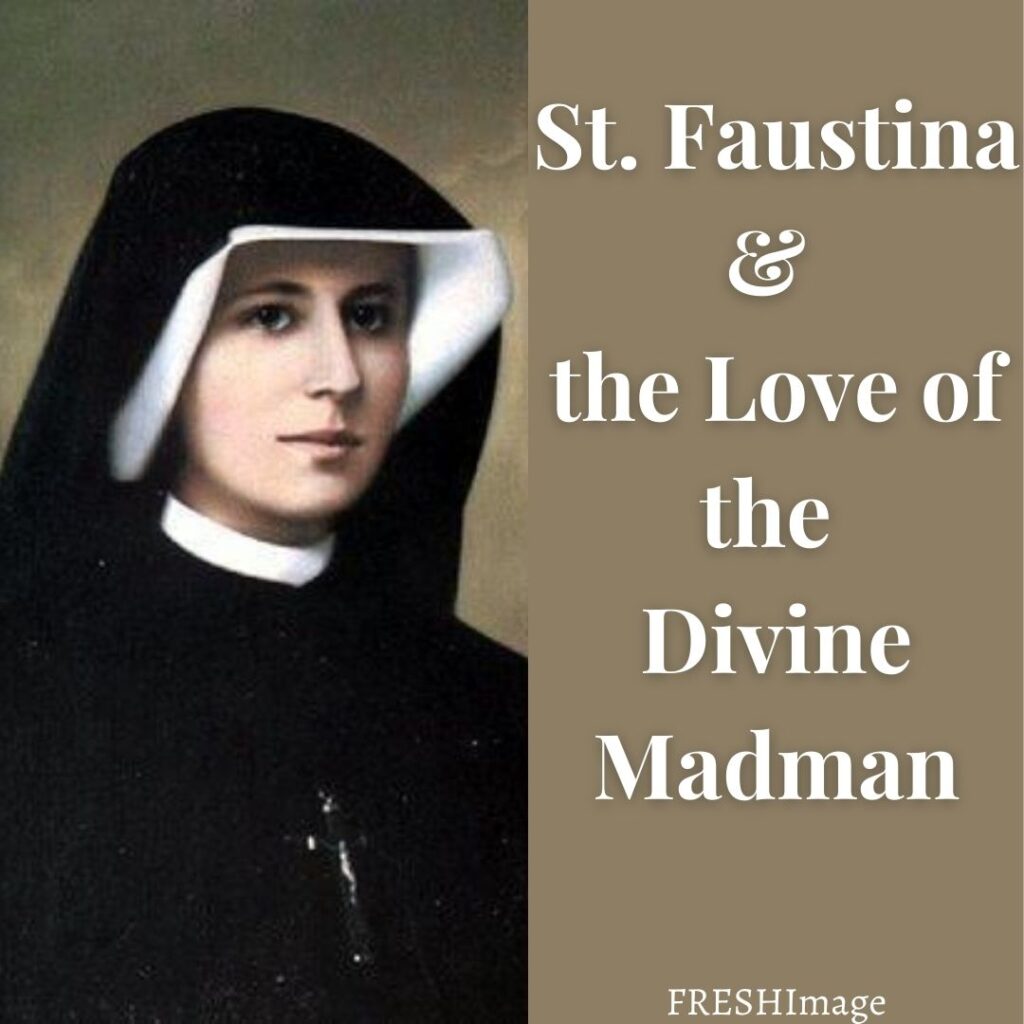
Happy Memorial of St. Faustina Kowalska!
“Hidden Jesus, Eternal Love, our Source of Life, divine Madman, in that You forget yourself and see only us. Before creating heaven and earth, You carried us in the depths of Your Heart…Love is heaven given us already here on earth. Oh, why do You hide in faith? Love tears away the veil. There is no veil before the eye of my soul, for You Yourself have drawn me into the bosom of secret love forever. Praise and glory be to You, O indivisible Trinity, One God, unto ages of ages!” St. Faustina Kowalska, Diary, 278.
Today’s celebration, much like yesterday’s Memorial of St. Francis of Assisi, reveals something of the radical quality of the Christian faith, this time with respect to Divine Love Itself. In the quote from her Diary, we see St. Faustina refer to Christ by the strange moniker of the “divine Madman,” immediately clarifying what she means, writing that Christ demonstrates this “divine madness” “in that You forget yourself and see only us.”
This is reminiscent of the Trinitarian theology of Hans Urs von Balthasar, who characterizes the relationship that obtains among the Trinitarian Persons as “divine recklessness.” By this, Balthasar means that the Trinitarian Persons give themselves totally to one another out of Love from all of eternity, never holding back anything, and that this complete gift of self is what principally characterizes Trinitarian Love (Theo-Drama, vol. 4, 327-328). The Incarnate life of the Son of God in Jesus Christ, then, manifests God’s desire that creation itself would participate in these dynamics of total self-giving and self-emptying love, the Son of God giving himself completely in order to reconcile all things to himself and so draw all things back into unity with the Divine Life.
While the whole of Christ’s life demonstrates this, we see it acutely concretized in two principal ways. The first is Christ’s sacrifice of the Cross, which makes this reconciliation possible. And, the second, is in the Eucharist, which makes present this very same act of divine self-abandon, but now in a way so as to draw the human family into this very same act, “drawing us into the bosom of secret love,” to use St. Faustina’s words, but precisely so that, having been so nourished by this love, we become what we consume. This is the Divine Mercy of which St. Faustina is the prophet, but this Mercy must never be understood individually. Christ does not lavish us in the Love of Divine Mercy to be our own private possession, but rather in order to transform us into vessels of Divine Mercy, meant to make this Merciful Love known and present to the world in reckless self-abandon.
St. Faustina, great saint of Divine Mercy, pray for us that we too might be enkindled with the fire of Divine Love, withholding nothing so that God’s Mercy might be known to all and that the Peace of Christ that surpasses all understanding might be realized in our hearts, families, cities and world.
Your servant in Christ,
Tony
Tony Crescio is the founder of FRESHImage Ministries. He holds an MTS from the University of Notre Dame and is currently a PhD candidate in Christian Theology at Saint Louis University. His research focuses on the intersection between moral and sacramental theology. His dissertation is entitled, Presencing the Divine: Augustine, the Eucharist and the Ethics of Exemplarity.
Tony’s academic publications can be found here.
Short and succinct- Divine Madman,